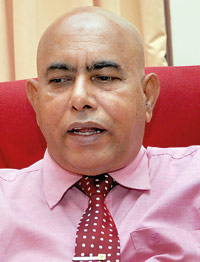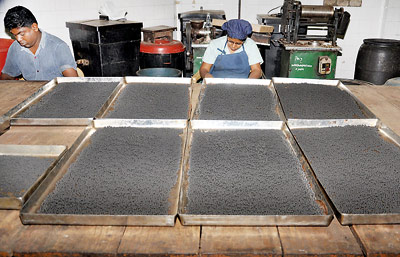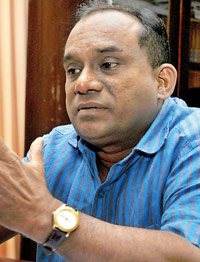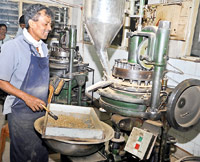News
Calls grow for laws to grow ganja for medicinal purposes
Ayurveda Commissioner P.S.K.R. Weerakoon has called on the Government to expedite measures to make cannabis cultivation legal as native medicine practitioners are finding it difficult to obtain the herb.

Ayurveda Commissioner P.S.K.R. Weerakoon
He said that at present they obtained much of the cannabis, a key ingredient in Ayurveda concoctions, from courts.
Last year, some 350 kg of cannabis produced in courts were sent to the department while 180kg were sent to native physicians involved in private practice and the Sri Lanka Ayurveda Drugs Corporation (SLADC).
“We get cannabis only through courts. Cultivating and transporting cannabis is illegal. Therefore we have to rely on police raids. We run into shortages when detections produce not enough cannabis,” he said.
Mr. Weerakoon said the Ayurvedic pharmaceutical industry needed both dried and fresh leaves, but when they receive the cannabis after long court procedures, the leaves are in a decomposing state, devoid of much of its medicinal value.
The commissioner said the Government should pass legislation to permit the cultivation and transportation of cannabis for medicinal purposes — with necessary safeguards to prevent abuse.
If that happened, the native medicinal drug industry would be able to obtain high quality cannabis and make drugs more effective. He said the country could even export the essence and cannabis-based drugs.
The commissioner’s plea follows Health and Indigenous Medicine Minister Rajitha Senaratne’s recent statement that Ayurveda physicians must be allowed to grow cannabis under strict conditions to meet the industry’s demand.
Dr. Y. Sisira Gamini, Assistant Director at the Ministry of Indigenous Medicine, said the cannabis was being used in the production of at least 16 Ayurvedic drugs, and, therefore, there should be a continuous supply process.

Cannabis is used in the production of at least 16 Ayurvedic drugs (above and below). Pix by Ranjith Perera
He explained that that some of these cannabis-based medicines were used to treat patients suffering from cancer, neurological disorders, rheumatoid arthritis and gastritis while they are also used in the production of vitality drugs.
“An overdose of cannabis is dangerous, but if used in the right way at the right time, even serious illnesses can be cured,” Dr. Gamini said.
He said that in Ayurveda the herb was used afterits intoxicating properties are removed in a process that involved boiling the leaves in cow milk and tempering it in ghee.
He said private Ayurveda physicians registered with the department were allowed to use the drug in their concoctions and products but the mixing of the drug had to be done at the Ayurveda Drugs Corporation.
The manufacturers could transport and distribute cannabis-based drugs, only if the product was registered with the Ayurveda Department.
Dr. Gamini said that as an Ayurveda physician he could understand the difficulties the native doctors were going through and their desperation.
Some doctors had been arrested and convicted for growing cannabis in their backyards even though they did so to make medicine.
He said laws should be passed soon to make cultivating cannabis legal for the use in the Ayurveda medicinal industry.
Acknowledging that the Ayurvedic drug industry faces a shortage of cannabis was Sri Lanka Ayurvedic Drugs Corporation General Manager M.J. Marasingha.

Dr. Y. Sisira Gamini
He said they had written to the police, urging them not to destroy the cannabis they seized during raids but to send them to the corporation through courts.
“The Government must permit cannabis cultivation under strict Health Ministry supervision or work out a method to send raided cannabis to the department without delay,” he said.
The Ayurveda Drugs Corporation used cannabis mostly for the production of drugs such as Madana Modakaya, which is known as an aphrodisiac, and Buddharaja Kalkaya.
Other cannabis-based medicinal preparations mentioned in the Ayurvedic Pharmacopoeia include Buddharaja Kalka, Jathipalaadi Choornaya, Hinguladhi rasaya (watee), Kameswara Modakaya and Ranahansa Rasayanaya.
Prof. Ravindra Fernando. Chairman of the National Dangerous Drugs Control Board said that growing, selling and possessing cannabis could be punishable under the Poisons, Opium and Dangerous Drugs Act, but the law allows the use of cannabis for medicinal purposes.
He said cannabis was grown illicitly, mostly in the dry zone and statistics showed that as much as 500 hectares of country’s land area was under cannabis cultivation.
Most people can use cannabis (also known as marijuana and ganja) without becoming addicted. But users with vulnerabilities such as stress, mental illness could become addicted to the drug, Prof. Fernando said.
Police Media Spokesman Ruwan Gunasekara said cannabis and cannabis-based products could be kept and used if they were for medicinal purposes but the physicians who make them must have a licence.
Pointing out that a law must be passed for the Ayurveda Department to cultivate cannabis, he said even in that case, police would have to be vigilant to prevent any abuse.
ASP Gunasekara said police destroy cannabis fields by spraying chemicals and they did not take into account the medicinal properties of the herb when they conducted raids, but they had no objections if the Ayurvedic Department obtained the cannabis through a court order.


